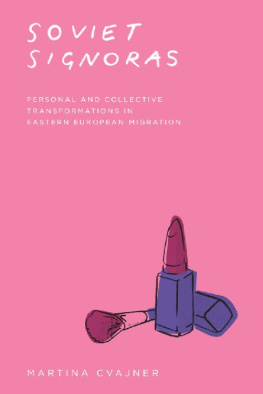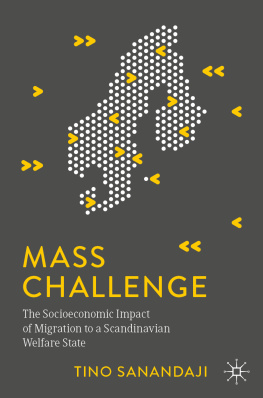Soviet Signoras
Fieldwork Encounters and Discoveries
A series edited by Robert Emerson and Jack Katz
Soviet Signoras
Personal and Collective Transformations in Eastern European Migration
Martina Cvajner
The University of Chicago Press
Chicago and London
The University of Chicago Press, Chicago 60637
The University of Chicago Press, Ltd., London
2019 by The University of Chicago
All rights reserved. No part of this book may be used or reproduced in any manner whatsoever without written permission, except in the case of brief quotations in critical articles and reviews. For more information, contact the University of Chicago Press, 1427 E. 60th St., Chicago, IL 60637.
Published 2019
Printed in the United States of America
28 27 26 25 24 23 22 21 20 19 1 2 3 4 5
ISBN-13: 978-0-226-66225-1 (cloth)
ISBN-13: 978-0-226-66239-8 (paper)
ISBN-13: 978-0-226-66242-8 (e-book)
DOI: https://doi.org/10.7208/chicago/9780226662428.001.0001
Library of Congress Cataloging-in-Publication Data
Names: Cvajner, Martina, author.
Title: Soviet signoras : personal and collective transformations in Eastern European migration / Martina Cvajner.
Other titles: Fieldwork encounters and discoveries.
Description: Chicago ; London : The University of Chicago Press, 2019. | Series: Fieldwork encounters and discoveries
Identifiers: LCCN 2019012199 | ISBN 9780226662251 (cloth : alk. paper) | ISBN 9780226662398 (pbk. : alk. paper) | ISBN 9780226662428 (e-book)
Subjects: LCSH: Women immigrantsItalySocial conditions. | Women foreign workersItaly. | ItalyEmigration and immigration. | Former Soviet republicsEmigration and immigration. | Europe, EasternEmigration and immigration. | Assimilation (Sociology)Italy.
Classification: LCC JV8138.C837 2019 | DDC 305.48/4120945dc23
LC record available at https://lccn.loc.gov/2019012199
 This paper meets the requirements of ANSI/NISO Z39.481992 (Permanence of Paper).
This paper meets the requirements of ANSI/NISO Z39.481992 (Permanence of Paper).
Contents
Something wrong was unfolding before my eyes and I could not help feeling badly about it. The party intended to celebrate my return was not going as expected. I had been looking forward to that night for weeks. For many years, I had been doing fieldwork with a group of post-Soviet women employed as care workers in the northern Italian city I call Alpinetown. I had subsequently spent quite a bit of time abroad, staying in touch with the women, as the set had been known, only through Skype and occasional emails. I was looking forward to a great reunion.
I had pestered some of them to organize a welcome back party. Dasha had eventually given in. Some years before, she had married Gianfranco, the son of the old woman for whom she had done care work for many years. Small entrepreneurs of some means, they lived in a beautiful chalet with a view onto the entire town encircled by chains of mountain peaks. She had been adamant, however, in inviting only a small number of them, justifying this by saying that A large bunch of people is no fun, Martushka. We decided to invite the women who had become the main subjects of my ethnographic project in the early 2000s; they had been the collective core of Eastern European women pioneers in Alpinetown.
Late Sunday, Iryna, my closest friend in the group, arrived to pick me up in her car. She was already in full regalia, with heavy makeup, high heels, skinny black jeans, a white lace see-through shirt, and a large red belt. As always, even before greeting me, she scolded me for my sloppy, unfeminine dress.
After a short drive, we entered the gate of the chalet and parked the car. We were in a pleasant garden overlooking the river. The weather was warm, and the smell of a delicious borscht emanated from the kitchen.
Dasha was waiting for us on the patio. She was radiant, elegantly dressed, with short hair, little makeup, and no heels. Although like Iryna she was in her midfifties, she definitely looked younger. Dasha was proud to show off her wealth; Iryna was equally happy to constantly remind her about the origins of it. The gross humor, the constant bickering, and the blatantly invidious comparisons: that was precisely what I had grown to appreciate and enjoy as a token of friendship. I felt at home.
A bottle of wine later, I asked when the other guests would arrive. Dasha smiled and replied that the Ukrainians, as usual, would be late. Iryna did not laugh.
Other women arrived. One of them quickly noticed that there was no vodka available. Dasha replied that Gianfranco did not like it. As some of his friends were among the best winemakers in the region, she explained, she was giving the women a chance to try out some of the very best Italian wines. It was at that moment that I started feeling some creeping uneasiness. I suddenly felt that the party was not something that would have happened without my pressure.
I asked what the women were planning to do during the summer. Dasha was proud to state that they would go to an Italian resort on a Mediterranean island, where they would be able to relax. When you go back to your hometown, she said, there is no rest. Everybody wants to drink with you. Nobody minds his business. Some other women said they were planning to spend a few days in a working-class holiday destination on the Adriatic coast. In recent years, they had found it increasingly difficult to persuade their adolescent sons and daughters to travel back to Ukraine or Moldova. The kids would complain that nothing ever happens there.
Iryna, who planned to spend her holidays in the house she had slowly built in her Ukrainian hometown, decided it was time to draw a clear line against all the others. She said the kids needed to go back as much as possible, to practice their language and to stay with their own. She declared proudly that Lena, her daughter, had always spent all her holidays with her grandmother. To prove the effectiveness of her educational strategy, she claimed Lenas boyfriend was Ukrainian, not Italian. Another woman immediately retorted: Good luck! You will be happy the first time he gets drunk and beats her! Other women nodded and laughed. Iryna, who was one of the very few women in the group who had an Eastern European partner, felt isolated and on the verge of
A few minutes later, I entered the kitchen precisely as Iryna was accusing Dasha of living as a signora, having married an idiot who despises us all. Dasha retorted that Gianfranco had not been an idiot when he had hired that drunkard. She was opening an old wound that had laid dormant for a long time. Some years before, Iryna had asked for Dashas help in finding a job for Andriy, a newly arrived cousin who could not find a job and was unable to repay his many debts.
Iryna started shouting that she had no reason to be grateful to Gianfranco. Should I thank him for treating Andriy like an African? For giving him a hard job, paying him as a Moroccan? I was accustomed to the deep ambivalence the women felt toward signore, those immigrant women who had attained, usually through marriage, what they considered a middle-class status. It was the first time, however, in which the difference between the women and the signore had been presented as so wide as to be unredeemable.
The bell rang and another batch of women arrived. Dasha rushed to open the gate, and Iryna whispered it was time to return to the garden to the old Italian prick. In a swift change of temperament, she had gone back to the usual teasing mood. Speaking in a low voice, she said that Dasha, at least, has a nice house now... she does not need to wash old asses anymore. Only the ass of her old husband! I laughed and hoped for the best.









 This paper meets the requirements of ANSI/NISO Z39.481992 (Permanence of Paper).
This paper meets the requirements of ANSI/NISO Z39.481992 (Permanence of Paper).